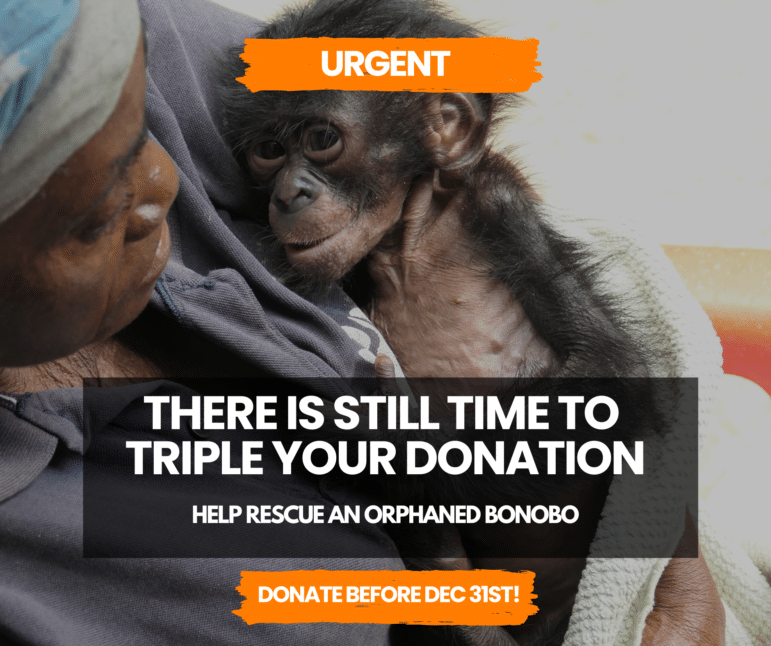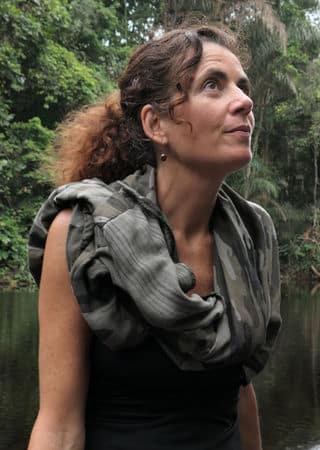Back in March of 2020, when the world truly appeared to be coming apart at the seams, Lola ya Bonobo closed our doors to tourists and went into full lockdown to protect the sanctuary bonobos.
For months on end, nearly two dozen devoted staff members lived with the bonobos full time, never going home to see their families. The only individuals that went in or out of the sanctuary during lockdown were veterinarians, bringing incoming orphan bonobos.

Risk of humans spreading infections to bonobos
We took this precautionary measure because it was widely believed by primatologists – based on experience with other viruses – that bonobos and other great apes are susceptible to the COVID-19 virus as well. We wanted to avoid that outcome at all costs! A COVID-19 infection among the sanctuary bonobos might have had disastrous implications for the already endangered species.
So we shuttered our doors, and said a temporary goodbye to an important revenue stream: tourism. We were not alone. Great ape conservation groups across Africa were suffering from a similar plight. Now, more than a year into the pandemic, many great ape conservation groups are wondering if there needs to be a major shift towards funding models that don’t rely so heavily on tourism.
The effects of the pandemic on great ape conservation organizations – including Friends of Bonobos – are explored in depth in a recent Mongabay article by Heather Richardson.

Conservation organizations such as the Great Ape Survival Partnership saw a huge decrease in tourism funding. At the same time, poaching increased. In 2020, poachers killed a gorilla in Uganda, marking the first time a gorilla was hunted in 10 years. Sanctuaries across Africa took a hit as well. Many organizations like Sweetwaters Chimpanzee Sanctuary had to cut salaries and suspend nonessential spending as the income from tourism all but disappeared.
At Friends of Bonobos, we suffered plenty of setbacks as well.

At Friends of Bonobos, we suffered plenty of setbacks as well. Pandemic travel restrictions meant that we had to delay our plans (yet again) to release a group of bonobos back into the wild. With no one traveling, and no one able to visit the sanctuary, our outreach and education programs had to be put on hold. Thoughts about beginning a new bonobo trekking industry were pushed to the back of our minds.
We lost all our daily visitors, international travelers, and visiting researchers, and with them the income they bring. And on top of it all, we saw an increase in rescues of bonobo babies in need – perhaps because of a greater reliance on bushmeat hunting when poverty and hardship strike DRC communities.
Right now at Lola ya Bonobo, where tourists have returned in limited capacity, all visitors must wear a mask and face shield. We are used to shielding the bonobos from human diseases, and have had protocols in place to limit transmission for years.
Many sanctuaries, however, still remain closed to tourists, and although many African countries have prioritized conservation in vaccine rollout, it’s safe to say that high vaccination rates in Africa are a long way away.
Drawbacks to depending on tourism

The pandemic has exacerbated the need for conservation organizations to reevaluate the sustainability of tourist-dependent revenue streams. Some alternative ideas include conservation taxes on corporations and “wildlife credits,” where people are paid to protect endangered species. But definitive solutions remain elusive.
As for us, we are confident the pandemic hasn’t put an end to tourism forever – we love seeing faces light up when people see bonobos for the first time! There’s nothing quite like seeing the bonobos in person, in their natural habitat.



